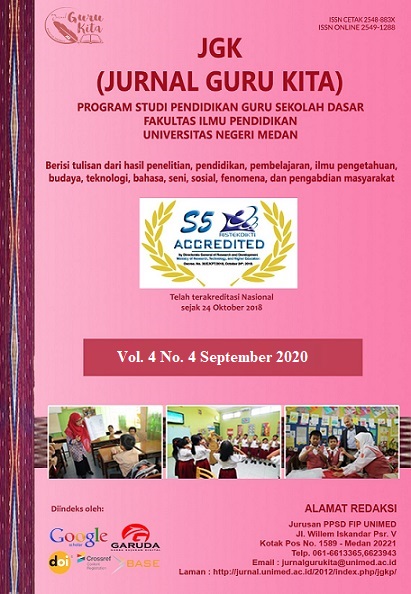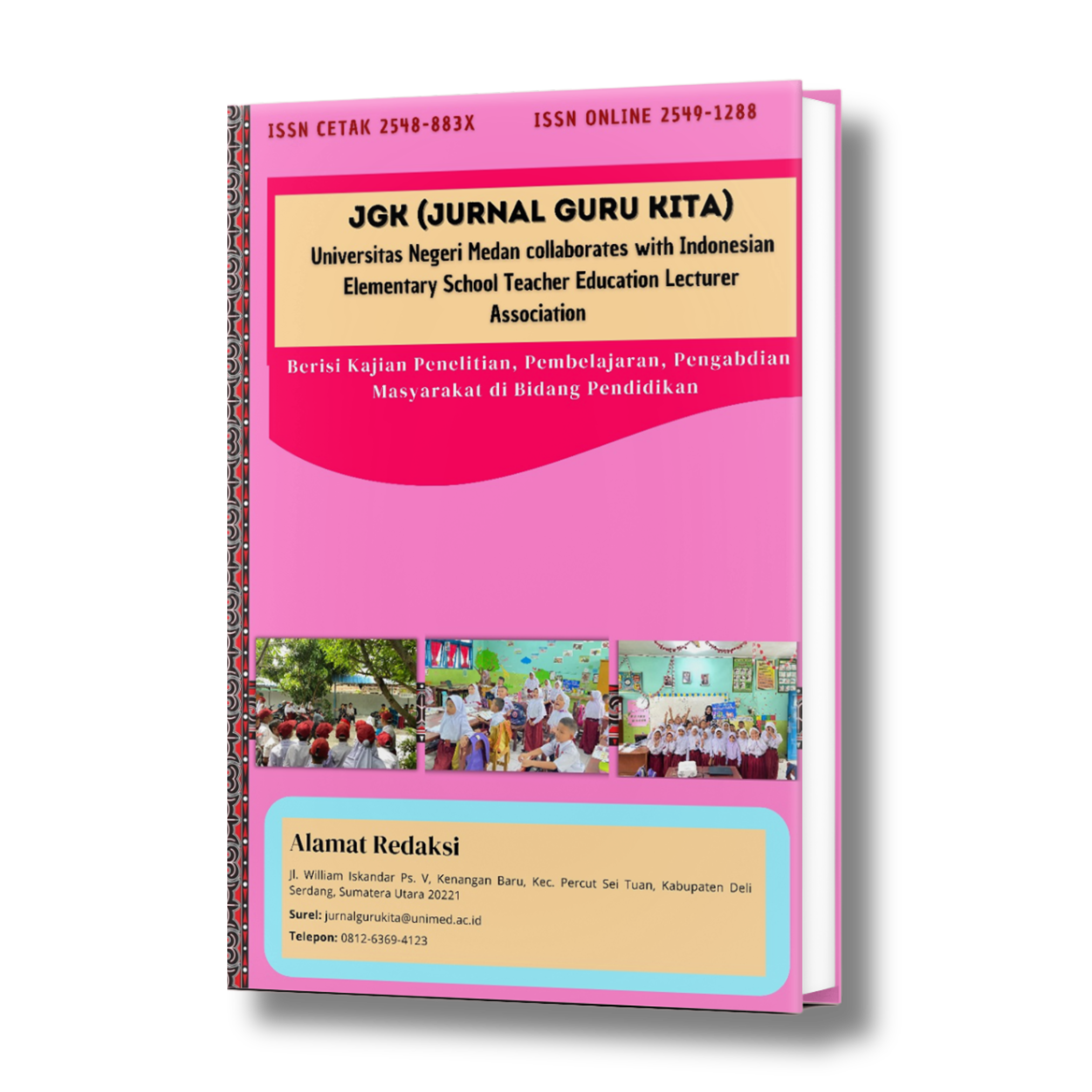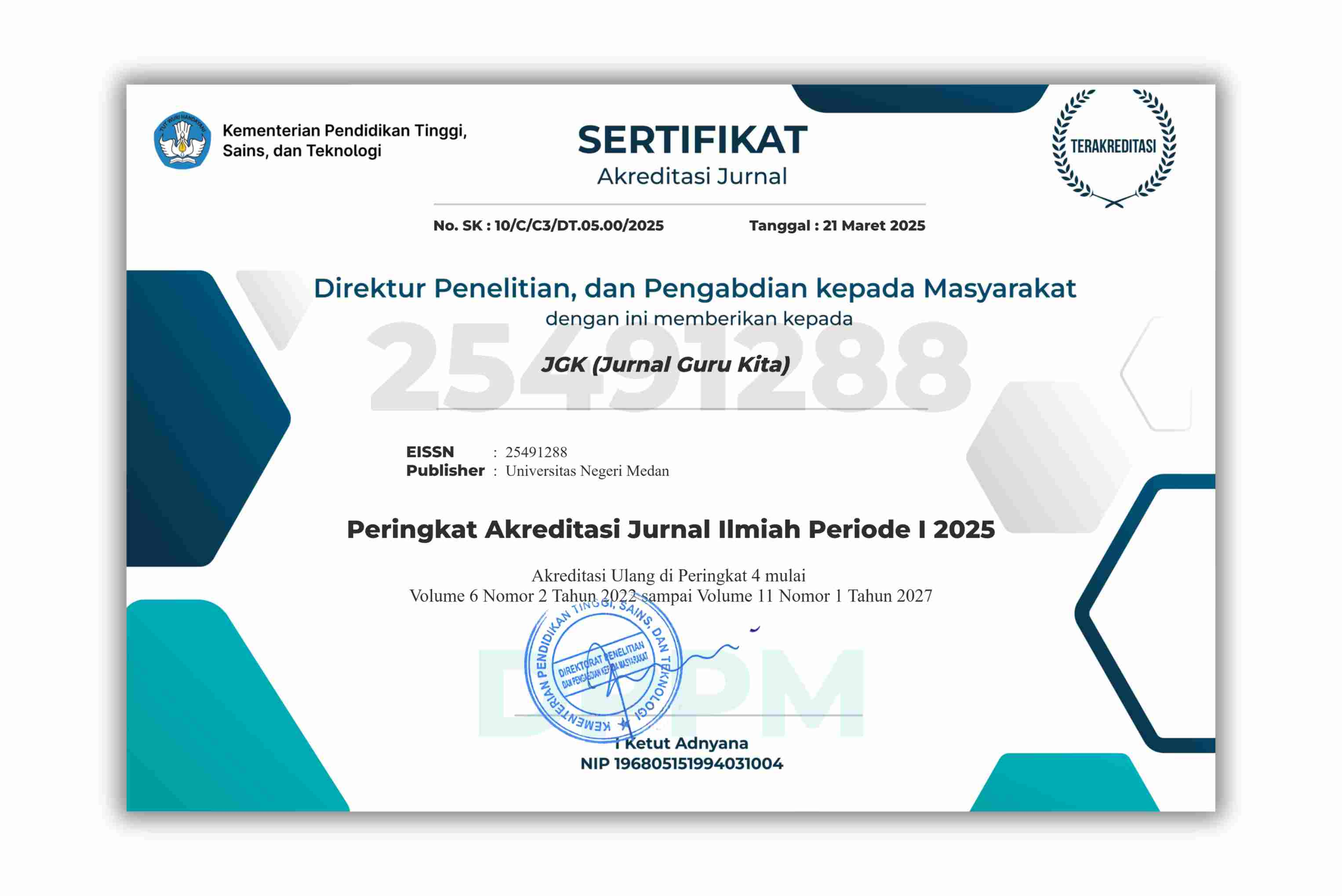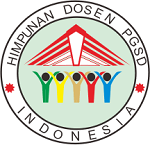PENERAPAN PENDEKATAN BERBASIS GENRE DENGAN AUDIO VISUAL AID UNTUK MENINGKATKAN KEMAMPUAN MENULIS SISWA KELAS 11 MADRASAH ALIYAH NEGERI SERDANG BEDAGAI
DOI:
https://doi.org/10.24114/jgk.v7i2.40100Keywords:
Keyword, Writing Skill, Audio VisualAbstract
APPLICATION OF A GENRE-BASED APPROACH USING AUDIO VISUAL AID TO IMPROVE THE WRITING ABILITY OF CLASS 11 STUDENTS OF SERDANG BEDAGAI MADRASAH ALIYAH. The purpose of this study was to determine the effectiveness of applying GBA with Audio Visual Media in Teaching Listening to improve writing skills in grade 11 students at MANSB. The research subjects were all students of class XI MANSB. The procedure for this research includes: Preparing the GBA learning model; Determination of the treatment class/group, namely the control group and the experimental group, Conducting pre-tests, Conducting teaching and learning activities (KBM) in the experimental class and control class with the GBA learning model, Conducting Post-tests, and Analyzing data. The learning outcomes in the experimental class (Pre-Test) were 36 students,60.00.and in the control class (Pre-Test) of 35 students, most students (13 students or 37%) got scores in the range50.01 - 60.00.The learning outcomes in the experimental class (Post-Test) were 36 students, the majority (8 students or 22%) got the core in the82.51 - 88.33.and in the control class (Post-Test) of 35 students, most of the students (12 students or 34%) got scores in the62.51 - 70.00.References
REFERENCE
Ali, SS, & Ramana, VL (2018). œAcademic Writing Challenges in Universities in Saudi Arabia and Their Solutions. International Journal of English and Humanities, 4(10), 291-298.
Arikunto, S. 2010. Research Procedures A Practical Approach. Jakarta: Rineka Cipta.
Coal, FA (2017). œImproving Students' Ability to Write Announcements Through the Gallery Walk Technique for Grade VIII MTs Jam'iyatul Alwashliyah Tembung Academic Year 2016/2017. Medan. UIN North Sumatra.
Boyle, J.P. (1984). œFactors Influencing Listening Comprehension. ELT Journal, 38(1), 34“38. doi:10.1093/elt/38.1.34
Broughton, G. et al. (1980). Teaching English as a Foreign Language. 2nd edition. New York: Routledge & Kegan Paul Ltd.
Chocolate, HD (2007). Teaching by Principle: An Interactive Approach to Language Pedagogy. parent. Retrieved November 15, 20017, fromhttp://citeseerx.ist.psu.edu?viewdoc?summary?doi=10.1.1.468.7924
Cahyono, SP (2017). œImplementation of a Genre-Based Approach to Teaching Narrative Listening. Advances in Social Sciences, Education and Humanities Research (ASSEHR), volume 66.
Dahnianti, A. (2018). Utilizing Student Visits To Improve Ability In Writing Descriptive Texts. Thesis. Department of English Education, Education and Teacher Training, Muhammadiyah University Makassar.
Derewianka, B. (2019). Pedagogic Grammar Relevant for Today's Classrooms. The second handbook of teaching English, 821-845.
Dirgeyasa, IW (2016). A Genre-Based Approach: What and How to Teach and Learn to Write. English Language Teaching, 9(9), 45-51.
Dyaksa, Gede AS, et al. 2018. "Developing Genre Based Approach Instructional Video On Teaching English Based On Curriculum - 13 For Senior High School English Teachers." e-JournalJurnal: UniversitasPendidikanGaneshaDepartment of English Education.
Elashri, II-E. (2013). The Effect of a Genre-Based Approach on Teaching Writing on the Writing Skills of EFL Al-Azhr Middle School Students and Their Attitudes toward Writing. (Dissertation). Faculty of Education Department of Methods and Curriculum, Mansoura University, Mansoura.
Fuady, MJ (2017). Development of an Online Learning Evaluation Application for Distance Education. Techno, 26(2).
Ginting, MFM (2020). Promoting Students' Writing Skills: A Genre-Based Approach in the Indonesian EFL Context. Lexeme: Journal of Linguistics and Applied Linguistics Vol. 2 No. 1, 2020. Available online athttp://openjournal.unpam.ac.id/index.php/LJLAL
Guan, X. (2010). Interactive Listening: Building Definitions and Operations in the Test of English as a Foreign Language. Journal of Chinese Applied Linguistics, 33(6), 16“39.
Harmer, J. (2007). English Teaching Practice, Fourth Edition. Pearson Longman: Harlow.
Haryanti, H., & Sari, F. (2019). Using a Genre-Based Approach to Improve Narrative Text Writing Skills for Class XI SMA Ethika Palembang. Journal of the English Language Community, 3(1), 280-288.
Hendrawati, N. (2019). The Influence of Listening to English Pop Songs on Increasing Students' Vocabulary at LKP Nuansa Jaya. Loquen: Journal of English Studies, [Sl], v. 12, n. 1, p. 56-65, July 2019. ISSN 2621-1998. Available in:http://jurnal.uinbanten.ac.id/index.php/loquen/article/view/1192Date accessed: 14 February. 2022. doi:http://dx.doi.org/10.32678/loquen.v12i01.1192
Hidajat, I. (2015). Article. The Basics of a Genre-Based Approach: What To Do in Four Stages. https://ichsanhijajat.wordpress.com/2015/11/05/200/
Hidayati, KH (2018). Teaching Writing to EFL Learners: An Investigation of the Challenges Facing Indonesian Teachers. Langkawi:Journal of the Association for Arabic and English, 4(1), 21-31.
Hyland, K. (2013). Genre-Based Pedagogy: Social Responses to Process. Journal of second language writing, 12(1), 17-29.
Insani, NA (2020). Using Instagram to Improve Students' Writing Skills in Descriptive Text. Makassar: Makassar Muhammadiyah University.
Jou, YJ (2017). Study of English Listening Strategies Applied by Students of the University of Technology, Department of Applied Foreign Languages. Cheng Shiu University
Martin, JR, & Rose, D. (2012). Working With the Meaning of Discourse Outside the Clause. London: Continuous.
Morton, T. (2010). Using a Genre-Based Approach to Integrating Content and Language in CLIL. Language use and language learning in the classroom CLIL, 81-104.
Neeraja, KP (2013). Nursing Education Textbook, published by Jaype Brothers Medical Publisher.
Nordin, SM (2017). The Best of Two Approaches: A Process/Genre Based Approach to Teaching Writing. English Teacher, 11.
Pratiwi, KD (2016). Students' Difficulties in Writing English (Study on Semester III Students of the English Language Education Study Program, University of Bengkulu, Academic Year 2011-2012). Linguists: Journal of Linguistics and Language Teaching, 3(1).
Rajagopalan, UM, &Jie, S. (2016, July). Adopting an SFL-Oriented Approach to Evaluating Genre-Based Academic Abstracts of EST Undergraduate Students in Japan. At the 2016 international conference on advanced mechatronic systems (ICAMechS) (pp. 510-515). IEEE.
In contrast, AR, Essential Instructional Technology, is published by Darya gaj New Delhi. (2014)
Ray, Yudi. (2020). Article. The Importance of Writing Skills: Why They Matter to Students. Easy & Peninsula Reader. Received fromhttps://easyreadernews.com/the-importance-of-writing-skills-why-it-matters-to-the-student/
Renandya, Willy A. 2012. "Five Reasons Why Listening Strategy Instruction May Not Work With Learners with Low Proficiency". The World of Online English Teaching, Vol.3
Reszy, YH (2013). Pengajaran Menulis Teks Deskriptif dengan Menggunakan Strategi Observasi Lingkungan. Jurnal Pengajaran Bahasa Inggris, 28-38.
Richard, J. (2009). Mengajar Mendengarkan dan Berbicara dari Teori ke Praktek. Cambridge: Cambridge University Press.
Risdayanti, R. (2020). Penggunaan Gambar Seri untuk Meningkatkan Keterampilan Menulis Siswa Siswa Kelas X SMAN 8 Pinrang Jurusan Bahasa Inggris Fakultas Tarbiyah Institut Agama Islam Negeri (IAIN) Parepare (Disertasi Doktor, IAIN Parepare).
Samawiyah, Z., & Saifuddin, M. (2016). Simbol Fonetik Melalui Metode Audiolingual untuk Meningkatkan Keterampilan Mendengarkan Siswa. Dinamika Ilmu: JurnalPendidikan, 35-46.
Selin, CM, Rice, ML, Girolamo, T., & Wang, CJ (2019). Speech-Language Pathologist Clinical Decision Making For Children With Certain Language Disorders. Language, Speech, and Hearing Services in Schools, 50(2), 283-307.
Serri, Fateme, et al. (2012). Cognitive, Metacognitive, and Social/Affective Strategies in Listening Comprehension and Their Relationship to Individual Differences. Theory and practice in Language Studies. DOIs:http://dx.doi.org/10.4304/tpls.2.4.843-849
Sudjana, N. (2004). Fundamentals of Teaching and Learning Process. Bandung: Sinar Baru, Algensido Offset.
Sugiyono. (2010). Educational Research MethodsQuantitative, qualitative, and R&D approaches. Bandung: Alphabet.
Syatriana, E. (2018). Applying Design Models in Teaching Writing through Reflection Strategies for Indonesian EFL Students. Senior Editor: Paul Robertson, 270.
Ulum, OG (2015). Listening: An Overlooked Skill in the EFL Context. International Journal of Social Sciences and Humanities Education. Vol. 2 Problems. 5 p.m. 257-270
Yasuda, S. (2015). Exploring Changes in FL Writers' Meaning-Making Choices in Summary Writing: A Systemic Functional Approach. Journal of Second Language Writing, 27, 105-121.
Downloads
Published
How to Cite
Issue
Section
License
Authors published with the JGK (Jurnal Guru Kita) agree to the following terms:
- Authors retain copyright and grant the journal the right of first publication with the work simultaneously licensed under a Creative Commons Attribution License (CC BY-SA 4.0) that allows others to share the work with an acknowledgment of the work's authorship and initial publication in this journal.
- Authors are able to enter into separate, additional contractual arrangements for the non-exclusive distribution of the journal's published version of the work (e.g., post it to an institutional repository or publish it in a book), with an acknowledgment of its initial publication in this journal.
- Authors are permitted and encouraged to post their work online (e.g., in institutional repositories or on their website) prior to and during the submission process, as it can lead to productive exchanges, as well as earlier and greater citation of published work. (See The Effect of Open Access)

























